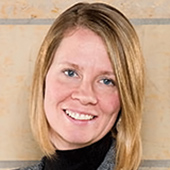G. Sue Kasun

Ph.D. in Curriculum and Instruction, 2012
As a white person, I had the experience of being an ethnic minority among my colleagues and the faculty with whom I took classes. I was able to learn with and from the other students’ embodied “theory in the flesh” (to cite Chicana feminist Cherrie Moraga’s work, often drawn upon in my program). I was able to make better sense of my own complicated place in the history of the U.S., as well as white cultures, as I made more sense of diversity and how it is understood and misunderstood in the field of education, all the while bearing in mind how my work could be situated in making the field of education more equitable and rigorous for all students.
I was able to go to Mexico for part of my dissertation research, using the guidance of my mentor, Luis Urrieta, to help me both do my work with sensitivity and conceptualize it. Dr. Urrieta held me and all of his students to a standard of excellence that wove together the expectations of standard Western academic knowledge with the ways of knowing of historically marginalized perspectives. I also was fortunate in having worked as Dr. Urrieta’s teaching assistant for sociocultural influences on learning and was able to map his wisdom of practice into how I taught my own several sections of the course as an independent instructor.
Additionally, I helped run Institute for Community, University, and School Partnerships (ICUSP) programs in Austin public schools. Coming from the Washington, D.C. area and Mexican schools, this allowed me to develop an additional set of lenses for understanding the landscape of the U.S. education system’s challenges. My program focused on contextualizing these challenges within Austin’s and Texas’s long history of tensions and alliances among racial and cultural groups. I also learned to critique education policy, seeing how the accountability movement, with many of its roots in Texas, played out. Finally, I had the fortune to facilitate the learning of pre-service teachers as they completed their final pre-service semesters in the urban education cohort.
Why UT?
I was excited to work with the faculty in the Cultural Studies in Education program. They had a long history of doing work that challenged the status quo in education, particularly regarding racial, class, and gender inequalities. They also used research methods that were sensitive to the populations with whom they worked, drawing into focus the strengths historically marginalized populations have, rather than pathologizing these communities. For too long I had been exposed to deficit thinking about Latino, African American, and immigrant populations (to name a few). I also knew I would learn new ways of problematizing and theorizing the challenges of education.
Life After UT
The preparation I received has provided me research lenses and tools that I feel are desperately needed in the field of education to pursue equity in education. I have both theoretical tools and hands-on research methodologies that help me push the field in my publications and in my teaching.
I have published in various journals, including Anthropology & Education Quarterly, Multicultural Perspectives, and Ethnography and Education. I had my first child, Maya, during my Ph.D. program at UT and my second, Kai, during my first year as faculty at Utah State. Since then, I have moved to Georgia State University where I can better apply my work among diverse populations that are geared more toward my research interests. I feel that the skills I learned from my program at Texas balance these rewarding roles with some amount of grace.
Advice for Students
If prospective students want to push themselves as far as they can, if they want to create a more just society through education, this is the program for them.

